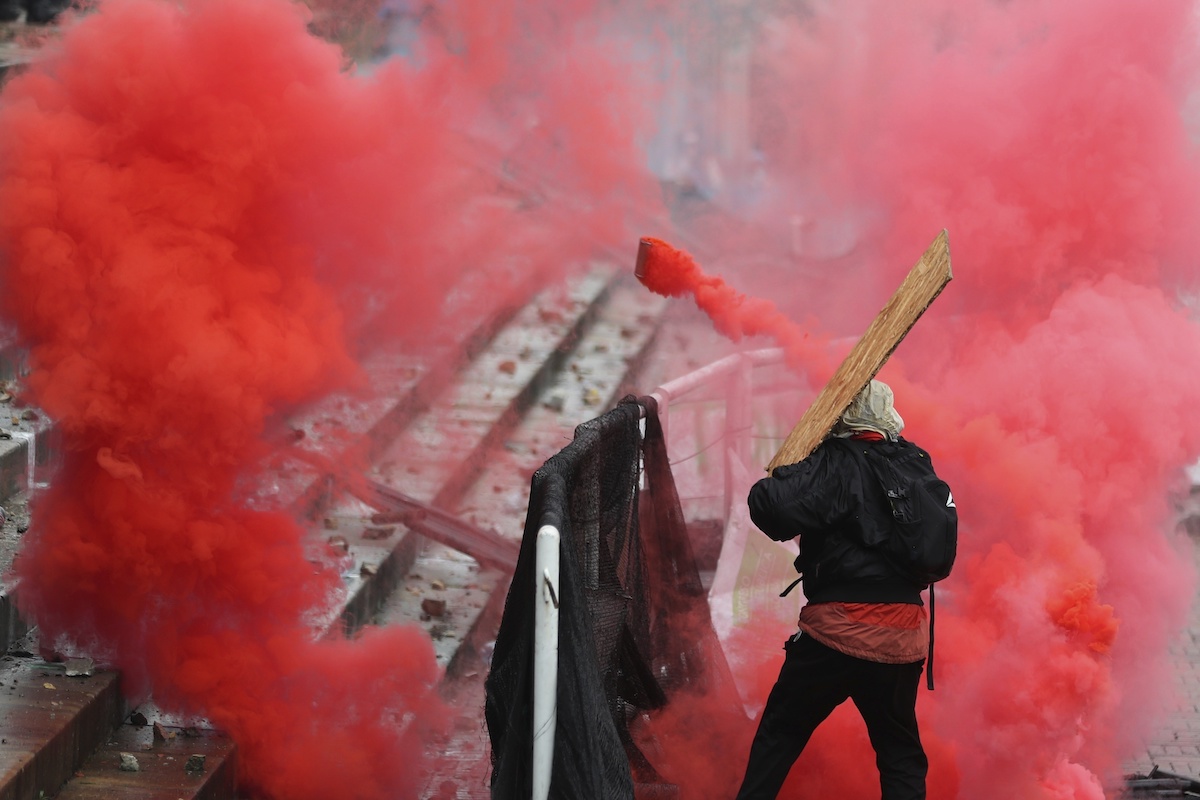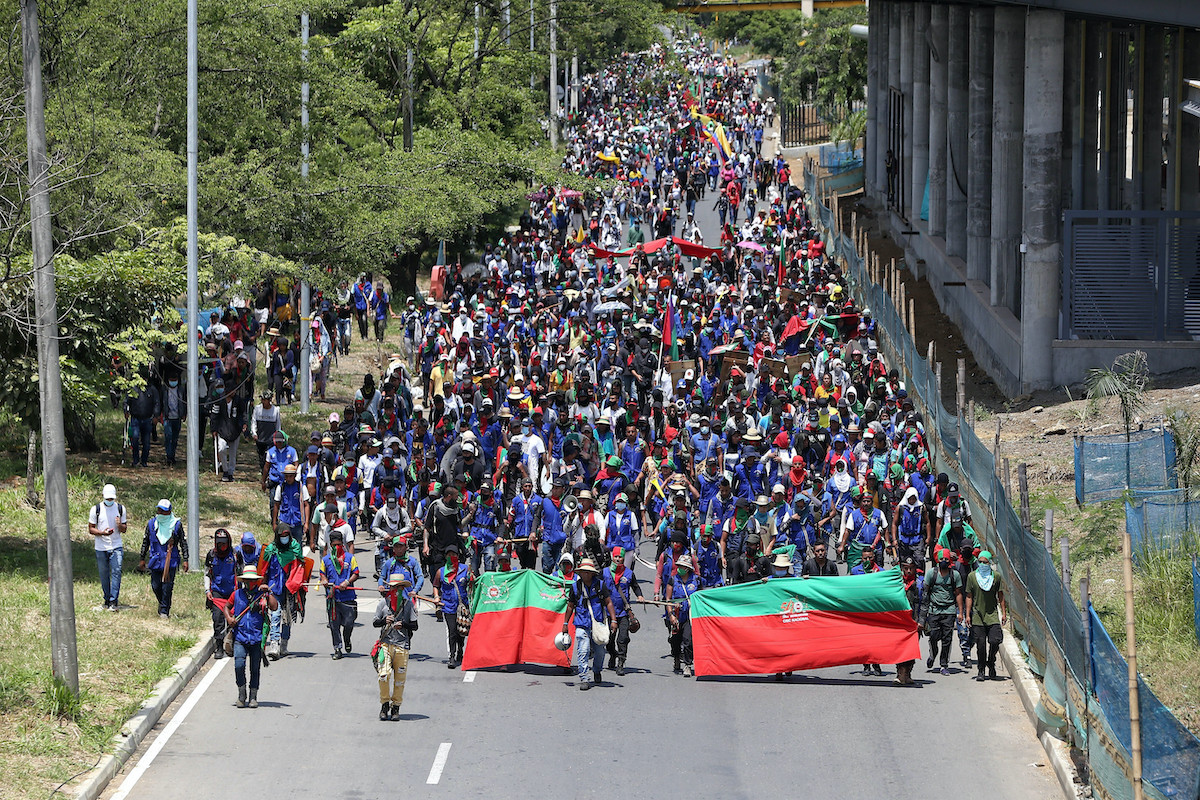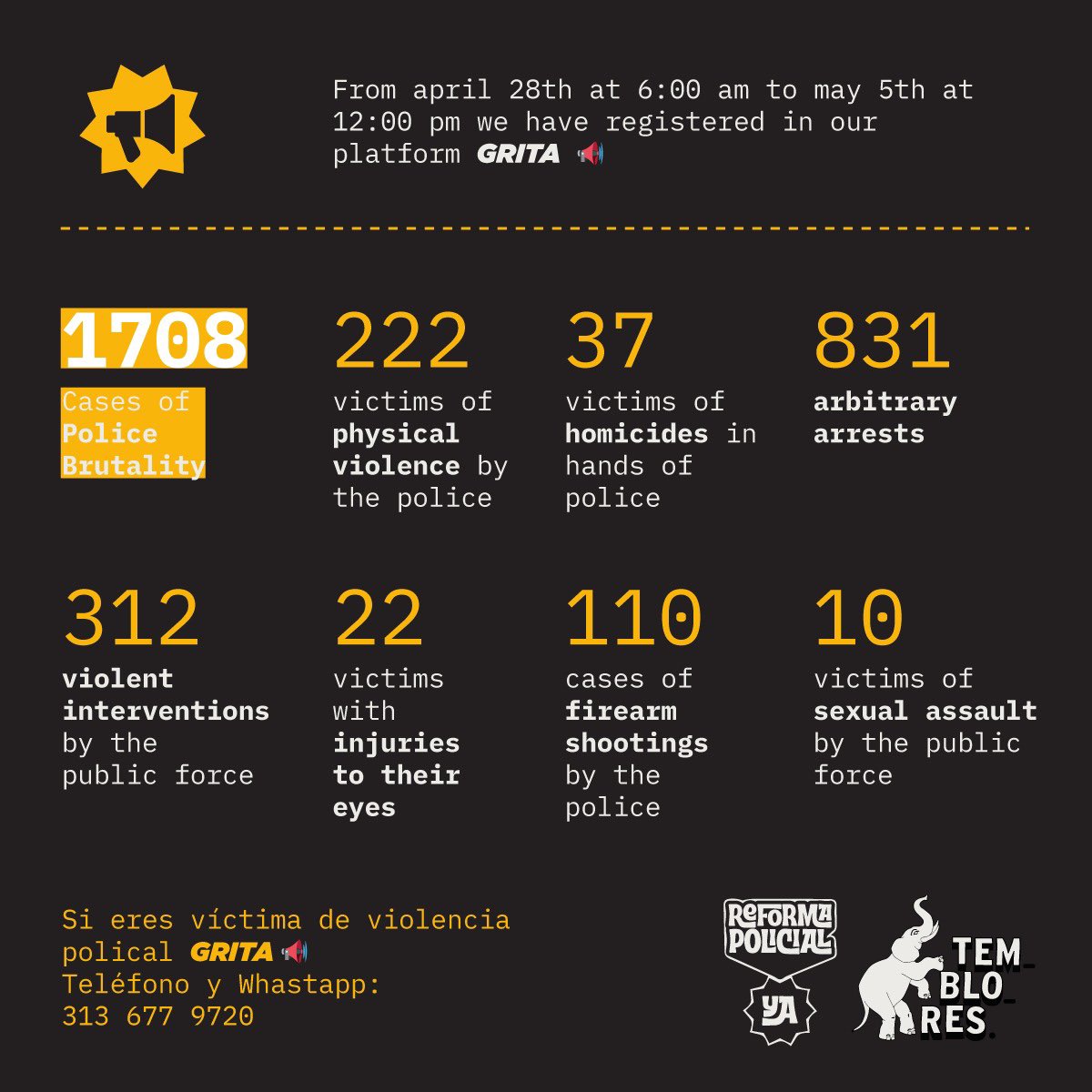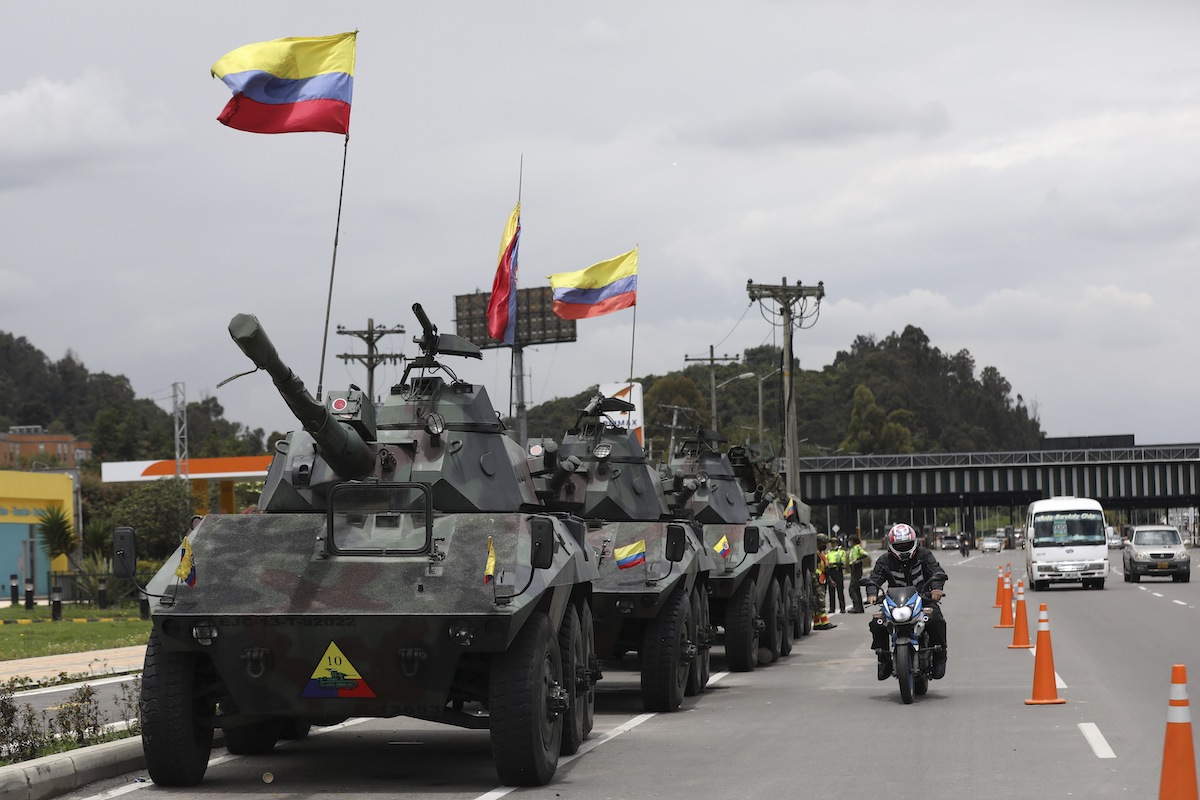

An anti-government protester during clashes in Bogotá, Colombia, Wednesday, May 5, 2021. (AP Photo/Fernando Vergara)
Hopelessness.
This is the feeling of many Colombians who have seen how in one week the country has become a scene of violence led by police aggression against protestors. All this in the midst of the third wave of the coronavirus.
Since April 28, hundreds of Colombians have posted on social media showing how the police have attacked civilians. All of the public outrage is juxtaposed against the silence of President Iván Duque’s government, which has not condemned any of the events.
According to the latest official data, the violent actions of police against protesters and activists in the national strike have left 24 dead, 17 of them in the region of Valle del Cauca, where the worst of the repression occurred.
However, data from Temblores ONG, an organization that has been receiving reports directly from citizens, says that as of May 5, 37 people have died due to police violence. They also say 1,708 people have suffered attacks from the police, adding that 10 people were even victims of sexual violence.
? Press release for public opinion and the international community on the physical and homicidal violence carried out by the Colombian National Police in the context of protests in Colombia’s National Strike. pic.twitter.com/kHGZNFqQnH
— Temblores ONG ? (@TembloresOng) May 5, 2021
Francia Márquez, one of the most important social leaders in Cali (the capital of Valle del Cauca) and the country at large, told Latino Rebels Wednesday night that residents in the Colombian city have experienced violent nights when people have been forced to defend themselves with rocks.
“We have seen nights of barbaric killings and assassinations at the hands of the security forces,” Márquez said.
En este momento, en la Clínica los Rosales, en Pereira, la policía ingresa para detener a los manifestantes heridos. @CIDH, la situación en Colombia es cada vez más grave: el Estado inició una masacre en contra del pueblo que salió a manifestarse en contra del gobierno. pic.twitter.com/RaMZC0Rngx
— Temblores ONG ? (@TembloresOng) May 2, 2021
She has been the victim of threats in the past, and now condemns the silence of President Duque, who so far has continued to justify military action to preserve public order. Márquez also said that the international community needs to ask the Colombian government to stop the police violence.
“Especially to the United States that puts money into the war in this country. We need the demilitarization of the country. We have to demilitarize and find the best scenarios for dialogue,” Márquez added.
The government has said that the military forces in the cities are being used to face the illegal armed groups that, according to them, are part of the National Strike that are protesting Duque’s tax reform proposals, which have no been withdrawn. On Monday, the country’s finance minister resigned in response to the protests.


Indigenous people march in protest against a tax reform proposed by the government, in Cali, Colombia, Wednesday, May 5, 2021. (AP Photo/Andrés González)
“Colombia faces particular threats from criminal organizations that are behind these violent acts,” Defense Minister Diego Molano said on Monday.
On Wednesday night, Lucas Villa, a young activist, ended up brain dead in Pereira after being shot by unknown individuals in a car. In another horrific case, 27-year-old Nicolás Guerrero, a young man who participated in a May 2 peaceful vigil on May 2 in Cali, was shot to death when riot police attempted to break up the demonstration. The event was recorded in a Facebook live broadcast. A similar event occurred Saturday, May 1 in the city of Ibagué, when 19-year-old Santiago Andrés Murillo was hit by a stray bullet allegedly shot by police and died.
Police captain Alberto Solano Beltrán, 38, died after being stabbed to death in Bogotá on April 28. Police stations have also been attacked and some demonstrators tried to enter the country’s Capitol on Wednesday. Many citizens, however, claim that these actions are not “proportional” to the violence they have experienced in the streets.


After various members of the international community made statements on the situation, including the United Nations and the U.S. State Department, Duque has set up a national dialogue. On May 10, the national strike committee will meet with Duque for a dialogue about the key demands of the people they represent. For now, reports indicate that the government is contemplating a State of Internal Commotion, which would give extraordinary powers to restrict fundamental rights such as walking in the streets at certain hours and even censuring radio or television broadcasts.
During these sleepless nights, Colombians are asking themselves who gives the order to those who go out to shoot, who are the armed civilians attacking peaceful demonstrators, why does the government not condemn the military repression and who benefits from this chaos.


Soldiers and army tanks guard toll booths on the outskirts of Bogotá, Colombia, Tuesday, May 4, 2021. (AP Photo/Fernando Vergara)
Five years ago, Colombia achieved an almost miraculous peace agreement with the FARC guerrillas after 60 years of civil war. This agreement, at one time unimaginable, seemed like a light of hope for the generations that grew up amidst news of assassinations and massacres. However, the implementation of the agreements has been delayed during the presidency of Duque, who opposed the peace process.
Like many of the right-wing governments in Latin America and even in the United States under the Trump administration, Duque came to power by scaring voters with rhetoric that Colombia was close to becoming Venezuela. However, the reality of the last few days makes it clear that Colombia has been bordering on dictatorship for several years now.
***
Juanita Ramos Ardila is a Colombian journalist who has written for El Tiempo and ColPrensa. An M.A. Journalism candidate at CUNY’s Newmark Graduate School of Journalism, Juanita is also Latino Rebels’ 2021 Summer Correspondent. Twitter: @JuanitaRamosA.



[…] For a week, people from all over the world have looked on in horror as the Colombian government’s crackdown on a national strike has been unforgiving. Different organizations have different tallies, but they all indicate […]
[…] D.C. — Senators returned to Capitol Hill on Monday for votes after a week away on recess that saw a spate of violent unrest and extrajudicial killings reported by news media and non-governmental organizations in […]
[…] unpopular tax reform bill triggered the current cycle of protests in Colombia, which started on April 28. But opposition to the bill was just the initial spark in a […]
[…] For a week, people from all over the world have looked on in horror as the Colombian government’s crackdown on a national strike has been unforgiving. Different organizations have different tallies, but they all indicate […]
[…] to Skrillex to Tokischa— there is no mention of the estallido social (social uprising) that Colombia is enduring at the moment. The fact that there is not even a line mentioning the political situation of the country is […]